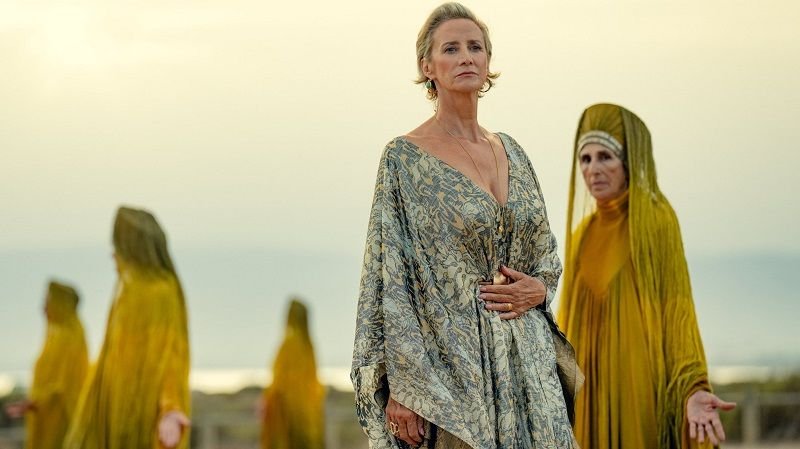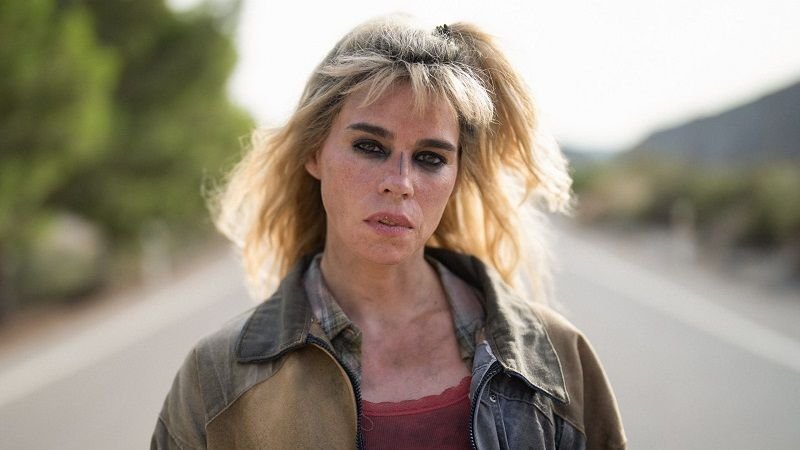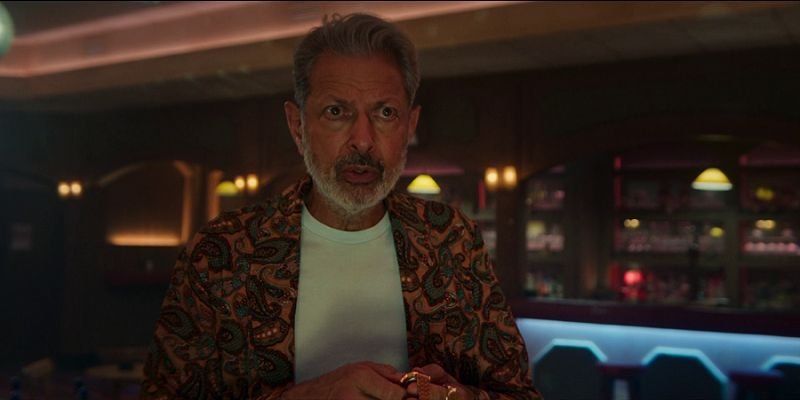Kaos (Netflix) Story :-
As chaos erupts on Mount Olympus and the mighty Zeus (Jeff Goldblum) succumbs to paranoia, three ordinary mortals are fated to alter the course of human destiny.
Kaos (Netflix) Release Date, Trailor, Songs, Cast :-
| Release Date | 29 August 2024 |
| Language | English |
| Genre | Comedy, Drama, Fantasy |
| Episodes | 8 |
| Cast | Debi Mazar, Aurora Perrineau, Fady Elsayed, Sam Buttery, Matthew Koon, Elander Moore, Amanda Douge, Daniel Monks, Susan Wooldridge, Joe Coen |
| Director | Georgi Banks Davies, Runyararo Mapfumo |
| Writer | Georgia Christou |
| Cinematography | Kit Fraser, Pau Esteve Birba, Tim Sidell |
| Music | Isabella Summers |
| Producer | Chris Fry, Jane Featherstone, John Woodward, Tanya Seghatchian, Nina R. Lederman, Charlie Covell, Georgi Banks-Davies |
| Production | Sister Pictures, All3Media, Brightstar, Anthem Studios, |
| Certificate | 16+ |
Kaos (Netflix) Review :-
It takes a few episodes to adjust to Charlie Covell’s modern and highly stylized take on Ancient Greek mythology in Kaos. The eight-episode series spans three realms—Mount Olympus, the island of Crete, and the Underworld—where a dire prophecy threatens Zeus’s (Jeff Goldblum) control over humanity and the immortality of his divine family. In this anachronistic world, ancient rituals, human sacrifices, and bloodsports are still in vogue, yet you can also find God-themed cereals at the grocery store and grab falafel from a food truck.
Despite the use of classical names for gods, tragic heroes, and other mythological figures, Kaos deviates significantly from traditional Greek aesthetics. The soundtrack features a mix of rock, pop, and showtunes from artists like Dire Straits, The Temper Trap, ABBA, and even the Wizard of Oz. Filmed in Malaga, Spain, with a blend of U.K., Irish, and American accents, the scenes set in Crete resemble a spring break getaway on the Spanish Riviera, which may very well be the show’s intended vibe.
It’s not unusual for UK productions to adapt classical or religious stories with a British twist—think Atlantis, Rome, or Good Omens. However, the oversaturated cinematography and the cheap, gaudy production design of Kaos—from the tacky earthly realm to Zeus’s kitschy celestial villa, decked out with inflatable pink flamingos, gold jewelry, and staff dressed like 1980s tennis ball boys—diminish the epic scale of the story. The dry humor that Charlie Covell previously used to great effect in End of the F**king World falls flat here, sapping much of the passion from these legendary tales.
Season 1 focuses on Eurydice, known as Riddy (Aurora Perrineau), Ariadne, or Ari (Leila Farzad), and Caneus (Misia Butler), three mortals intertwined by the prophecy. These mythical figures have been given a modern twist: Riddy, for example, is reimagined as Orpheus’s (Killian Scott, cast as a tragic pop star) discontented wife and a lost daughter who finds meaning in death rather than the typical damsel-in-distress. By episode 2, she starts working at the “Centre for the Unresolved,” a place for those who cannot be reincarnated because they were buried without coins. In this stark, black-and-white afterlife, she bonds with her colleague Caneus, who has a sweet disposition and a three-headed dog reminiscent of Cerberus. Caneus’s backstory, thoughtfully linked to Butler’s background as a trans man and Caneus’s mythological origins, is revealed gradually throughout the series.
In another storyline, Ari, burdened by guilt, takes center stage in a plot inspired by the legend of King Minos (Stanley Townsend) and his infamous Minotaur (Fady Elsayed). While Covell effectively removes the taboo of rape from Caneus’s backstory, the Minotaur’s origin is transformed into a much more complex and convoluted issue for Ari to navigate.
Midseason, a lackluster love triangle emerges involving Riddy, Orpheus, and Caneus. Although Scott effectively portrays Orpheus’s questionable “nice guy” persona and Perrineau captures Riddy’s marital dissatisfaction and frustration, the chemistry between her and the more sensitive Butler falls flat, mirroring the Underworld’s dull color scheme. In contrast, a more engaging and volatile romantic subplot involving Hera (Janet McTeer), Poseidon (Cliff Curtis), and Zeus proves far more captivating. Zeus’s petty behavior and the secrecy surrounding their affair heighten the tension, culminating in a dramatic climax as his paranoia escalates to genocidal levels.
Kaos (Netflix) Trailor :-
A notable strength of the series is its portrayal of the Greek gods’ tempestuous and remorseless nature, regardless of their domain. Jeff Goldblum, delivering a performance reminiscent of his Grandmaster role in the Marvel Cinematic Universe, captures Zeus’s infantile narcissism with moments of genuine menace. When Goldblum lowers his voice in anger, the scene becomes palpably intense. Both he and Cliff Curtis effectively portray the crassness and insecurity of newfound wealth, while Janet McTeer brings an aristocratic gravitas to Hera. Like Zeus, Hera delights in her coldhearted ruthlessness; her priestesses are forced to cut out their tongues to serve her, and in a shocking scene from the second episode, she demands the death of Zeus’s illegitimate “half-breed” child and transforms the mother into a bee. Not to be outdone, Zeus physically abuses his son, Dionysus (played with cheeky earnestness by Nabhaan Rizwan), in episode 1, opens fire on his ball boys in episode 4, and later tortures his weary brother Hades (David Thewlis). This is a far cry from Disney’s Hercules.
David Thewlis brings a rare gentleness to his portrayal of Hades, depicting the overworked ruler of the Underworld with a level of benevolence not typically seen in more antagonistic interpretations. His realm, too, is portrayed with refreshing nuance, avoiding the clichéd depiction of Hell and purgatory as a colorless, Kafkaesque industrial complex. Instead, it offers a more visually appealing contrast to the otherwise harsh and garish depictions of the heavenly and earthly realms in Kaos.
Covell weaves a rich tapestry of Greek myths and legends into the chaotic world of Kaos. Stephen Dillane charms as Prometheus, breaking the fourth wall as a narrator. Rakie Ayola infuses Persephone, Queen of the Underworld, with fiery defiance. The cast also features Debi Mazar as a no-nonsense Medusa, Billie Piper as a frazzled seer Cassandra, and Eddie Izzard, Ché, and Sam Buttery as the intriguingly gender-fluid Fates. However, as Homer warned in The Odyssey, “If you serve too many masters, you’ll soon suffer,” and Kaos struggles under the weight of its many characters and plotlines. The result is eight hours of narrative excess, swinging between intrigue and tedium as it drags toward a lackluster conclusion. With Netflix’s track record of canceling shows after just one season, Kaos might find itself sent to the Centre for the Unresolved before it has a chance to fulfill its epic, prophetic potential.
Final Thoughts
Kaos brings some inventive twists, drama, and intrigue to ancient Greek myths with impressive reinterpretations of classic legends. The series benefits from strong performances by Jeff Goldblum, Janet McTeer, and David Thewlis, who portray dysfunctional, immortal rulers entangled in power struggles and prophecies. However, the show suffers from being overly bloated, struggling to give justice to its large cast of characters. The clash between classical and modern elements often feels jarring and visually unappealing, and the darkly comic exploration of family, loyalty, love, and death seldom delivers a genuine laugh.





